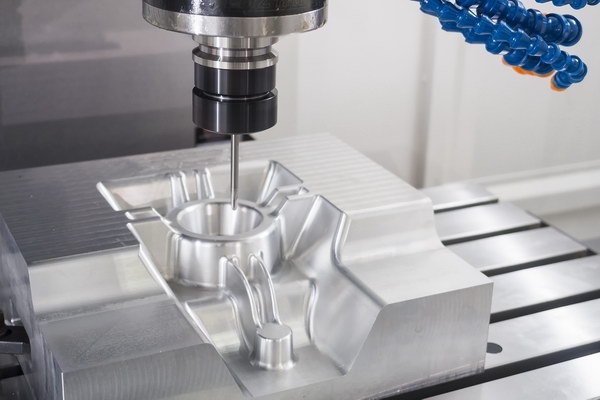The pieces being produced in complex machining services frequently have difficult patterns. They may need a number of steps and operations to attain the desired shape and accuracy. Utilizing numerous axes of motion, specialized equipment, and sophisticated programming approaches may be necessary for this.
Complex machining services based on CNC are a procedure that is more accurate than hand machining and can be reproduced in the same way repeatedly. The accuracy of the CNC machine guarantees a continuous level of product quality for use in precision machining services.
The regular monitoring of the quality process through inspection of its precision machined parts has boosted the speed and efficiency of CNC precision machining, which makes blockchain technology more effective. This article analyzes two novel Blockchain-based inspection techniques developed for CNC machining services.
DT technique and need for innovation
The industrial Internet of Things (IIoT) offers excellent service quality for tool inspection owing to the quick development and evolution of technology in accurate machining services. IIoT is one of my favorite domains when it comes to working with or even just a leisure project. The automating part is the most fun and accomplishing that gives me the most satisfaction. No wonder why I initially started posting Arduino tutorials on my blog as well as on my channel.
The Digital twin (DT) is a cutting-edge technology that was recently created in Industry 4.0 to provide a virtual version of real-world parts, goods, or machinery like precision-machined parts or CNC-produced goods.

With this oversight technology, a 3D graphic depiction of the completed workpiece may be produced using critical information about a machining process. This will produce a significant impact on creating effectual output. By connecting machining outcomes to machine performance, this digital twin
technology aids the inspection process of CNC for achieving accurate machining services.
It may seem utilized for simulations before the CNC precision machining manufacturing process. Traditional DT platforms, nevertheless, lack data protection, traceability, permanence, and stakeholder authentication. Additionally, it can be challenging to estimate manually how the CNC machine’s tools will wear out.
Immutable Data Recording and Traceability
Blockchain technology is utilized in a decentralized network for cloud manufacturing that combines encryption and smart contracts to share services among service providers and final users over a distributed record that is safe and trusted. Using blockchain technology, this network is secure,
verified, and traceable. The cryptographic algorithms that are employed to secure information and data stored are what give blockchain its immutability. That modifies input data into a defined fixed value in the form of characters. Each piece of information is kept in its own block and is represented by a unique cryptographic hash. Each block of data, such as facts or transactional information, undergoes processing using a cryptographic algorithm or a hash value.
Here is a long detailed article by IBM on blockchain technology if you are interested in exploring it more.
The data linked with the CNC machining process can be recorded and traced using the blockchain technique since it has the built-in property to generate an immutable and transparent ledger, the blockchain might be utilized to track every level of the manufacturing process, from design to manufacture to inspection. It offers details on the tools’ machine settings, measurements, checks and machine environment. Information cannot be rendered or deleted after every very value is recorded whenever it is stamped and cryptographically linked.

This process improves the traceability of machined parts throughout their life. Producers, suppliers, and purchasers might access the blockchain to verify the identity and record of every element, assuring that quality needs have been fulfilled at each part. Analysis of impacted parts becomes faster and much more accurate during errors or recalls.
Smart Contracts verification investment for CNC
Blockchain-based Smart Contracts are implemented at the inspection point of CNC precision machining services. A Blockchain configuration of decentralized nodes consisting of computational node locations, a system-on-chip on the same page, and an actual CNC manufacturing machine is used to construct the infrastructure for smart contracts based on blockchain technology. CNC machining inspection can be performed directly using smart contracts, self-executing contracts with the contract’s criteria encoded directly into the code. When a specific machining operation is eradicated, an intelligent contract is configured to start an inspection process immediately.
After the part has been machined, it is examined, and the inspection results are entered into the blockchain. The smart contract then immediately compares the assessment outcomes to the predetermined standards. If the component satisfies the necessary quality requirements, the smart contract may approve it for additional processing or dispatch. The contract may issue warnings if satisfactory standards are not reached, stopping the procedure and contacting the necessary parties.
The process can be depicted as the following flow of inspection steps:

The Disadvantage of Blockchain Implementation
There are currently no established protocols or frameworks for the blockchain industry, which is still in a growing state. The adoption of blockchain technologies may be hampered by compatibility problems as a result. The immutability of blockchain networks is a benefit, but it can also be a disadvantage.
Making upgrades or modifications to the blockchain network may be difficult in the event that security flaws or technological advances are found. It is crucial to thoroughly evaluate these drawbacks and design fresh, cutting-edge methods for meeting CNC inspection requirements with an emphasis on minimizing drawbacks. This prompts the use of blockchain technology to inspect CNC machines and provide precision machining services.
Conclusion
Blockchain-based inspection is gradually becoming both an integrated technology and a new CNC manufacturing model. This has the power to transform the complex machining services sector into manufacturing that is extremely service-oriented, interactive, and inventive. Still, there is a lot of research being done on applying blockchain technology to other CNC operations.

